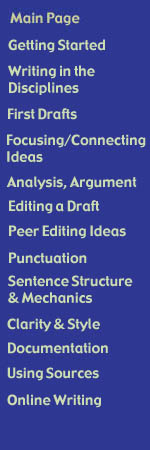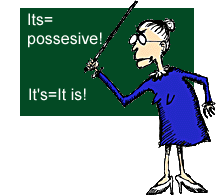

Faculty "Pet Peeves"
by Joe Essid, Writing Center Director
Kudos to Rebecca, who spotted an error placed in this document. She is the first person to do so, after nearly eight years.
(printable version here)
This list began for my own classes, and I update it regularly. Despite its name, the list is not that unique, but it may be unusual in that I have published it; most writers learn about their professors' likes and dislikes through the hard knocks of getting a marked paper back. Most Richmond students are decent writers, but they can be very careless. I tell my writers, "get ready to be careful."
I am no grammatical purist; even careful writers will make occasional mistakes. That said, it is safe to say that most items below reflect the tastes of other faculty members with whom I have spoken or who have sent students to the Writing Center.
A GIGANTIC hint: Read a final draft ALOUD. You will be surprised by the number of errors you catch! If you are still unsure about your work, have a friend read it aloud to you. If someone calls you "dork" for doing this, kick him or her and continue reading aloud.
- Rhetorical and Structural Peeves
- Sloppy Language Peeves
- Stylistic Peeves
- Careless, Silly, or Utterly Avoidable Peeves
- Retired Peeves
Rhetorical & Structural Peeves:
 Unsupported Assertions: Perhaps the biggest mistake made in writing for me. No, I do not expect my writers to cite every possible source and datum for an assertion. Just be forewarned that unsupported opinion is not welcome while writing for most faculty, unless an assignment asks for that.
Unsupported Assertions: Perhaps the biggest mistake made in writing for me. No, I do not expect my writers to cite every possible source and datum for an assertion. Just be forewarned that unsupported opinion is not welcome while writing for most faculty, unless an assignment asks for that.
Plot Summary: A curse in literature classes. The writer's audience--the teacher and the other students in class--knows the stories in the reading. That said, many students think that summary is analysis--not so. Read the page on analysis in Writer's Web to review this idea.
The "Dictionary" Intro: Most college teachers have read, and gnashed their teeth over, papers that begin "Webster's defines X as. . . ." This tactic is a pit into which many freshman writers stumble. Please do not write this way in college. It was a handy tactic in high school, but it is as rotten as Noah Webster's cadaver now. It drives most college professors insane (students may enjoy this...).
The "March of History" Intro: Almost as rotten--avoid any papers that begin with "In history's panorama, one truth is. . ." or "In the textures that make up the tapestry of English Literature. . . ." Dr. Zaius spoke that way when he read from the Sacred Scrolls in (the original and superior version of) Planet of the Apes. These types of introductions work in epic film, but not in college essays. Cut them and cut to the chase, please.
Here a second rule, after "read aloud," comes into play. ASK your professors about words and terms that make them go crazy or, quite often, that work in one field of study but not in another. My own loathed usages follow.
"Comfort Zone": A recent addition that I HATE partly because it sounds so wimpy, secondly because it reflects too many students' desires never to take intellectual or social risks. Use it and lose credit!
"Disconnect" This word appears in journalistic prose, and I suppose as a new word there is not much wrong with it, but students overuse it. Try some options when you mean "disagreement," "rupture," "misunderstanding," or similar. See my post on it here.
"Irregardless": This word is the Paris Hilton of our language: everywhere, obnoxious, stupid. Please use "regardless." Think about what "irregular" or "irrational" mean. "Regardless" already means "without regard to": "irregardless," by its nature, is redundant.
"Novel": Only a book-length work of fiction is a novel. Using the term for other works (nonfiction, collections of short stories, memoirs, works of history, philosophy, and the like). I dock writers a full +/- grade for this error alone.
"Society": Students love this word. It is, however, lazy language. When a student writes "society would not tolerate the indignity of TSA strip-searches," who is this "society?" If we mean "air travelers," then it is wise to write that. Folks who refuse to fly are part of "society," too, but they probably would not care and might even welcome a new excuse to never board a plane.
"Super": Everyone seems to enjoy this catch-all superlative in speech. It is lazy looking in writing. There are many superlatives, from "very" to "extremely" and beyond, many of them super nuanced! Use "super" for me and lose points. I hate this word so much I did an entire blog post on why.
 "-wise" Suffix: Why do the bubble-heads on TV say "Weatherwise, we're going to have a hot day"? Why does the car dealer tell you "Pricewise, this 9000 SUX is the best buy on the market"? Although I would enjoy watching many newscasters being lashed on television and car-dealers taken for a scrape down Broad Street, there is a plausible reason for these abominations: the need to compress language to fit into a script or advertising copy. This usage is not grammatically incorrect, since language can change to accommodate it. The usage is, however, too informal and too cliched for academic writing. Avoid it like the Bubonic Plague.
"-wise" Suffix: Why do the bubble-heads on TV say "Weatherwise, we're going to have a hot day"? Why does the car dealer tell you "Pricewise, this 9000 SUX is the best buy on the market"? Although I would enjoy watching many newscasters being lashed on television and car-dealers taken for a scrape down Broad Street, there is a plausible reason for these abominations: the need to compress language to fit into a script or advertising copy. This usage is not grammatically incorrect, since language can change to accommodate it. The usage is, however, too informal and too cliched for academic writing. Avoid it like the Bubonic Plague.
Other Misused Words: Don't let the list on the Web overwhelm you, but I mark these words and teach writers how to use them correctly.
"Now back to our regularly scheduled peeves, facutlywise" (Ahhhhhh! STOP THAT!). I mean, back to peeves that many faculty share.
Overused Words and Phrases: A faculty mentor once told me to stop using the verb "posit." Do you have any well-worn phrases that you love? There is no hard-and-fast rule, but vary your language!
First & Second Person: I have employed "you" in this document. I have also used "I" repeatedly. The old "never use I" rule is dying. It is not a peeve for many faculty, nor in many fields of study where it was once forbidden. Not sure in your class? ASK. As for "you," depending on context it can resemble pointing a finger to single out someone. Is that really the best strategy to pursue when a writer wants to convince an audience? Where possible on this page, I have used "a writer" instead of "you" because I do not want to single you out as a dreadful pet-peeve flaunter!
Thesaurus-Speak and Clichés: Some writers think that they can vary their language by finding synonyms in a thesaurus. To pull off this trick, a writer must really understand how to use the synonym in context. Done properly, this method can actually expand a writer's vocabulary. If not, the professor ends up reading this:
Original: "The novel has a lantern-jawed, two-fisted protagonist, Buck Buckaw. This man's man of a protagonist must overcome the difficulties of life in Alaska. This wild region challenges the protagonist until he reaches his wit's end."
Thesaurus-Speak: "The novel has a male lead, Buck Buckaw, who. . ."
If we were talking about a film, the substitution might work. Since the work under discussion is a novel, "male lead" is not an acceptable term.
Better Revision: "The novel's protagonist, Buck Buckaw, must overcome the difficulties of life in Alaska. Despite the hero's great strength and courage, the wild region challenges him until, finally, he snaps."
I not only revised the referent to Buck, but I also removed the comic-book descriptions of him (a host of moldy cliches) from both sentences.
More reading about cliches
Careless, Silly, or Utterly Avoidable Peeves:
 "It's, Its": It may be better never to use a contraction at all in formal work, but academic writing is getting less formal. Still, Mrs. Grundy would clobber a little kid for this flub. So will I. I do not care if I lose this battle, but I will stand my ground until someone invents a better rule. "It's" means "it is" while "its" is the possessive form of "it." It's quite easy to put the correct word in its place, once you have the hang of it. Got it? English is full of irregular usage. Now you know one instance.
"It's, Its": It may be better never to use a contraction at all in formal work, but academic writing is getting less formal. Still, Mrs. Grundy would clobber a little kid for this flub. So will I. I do not care if I lose this battle, but I will stand my ground until someone invents a better rule. "It's" means "it is" while "its" is the possessive form of "it." It's quite easy to put the correct word in its place, once you have the hang of it. Got it? English is full of irregular usage. Now you know one instance.
Apostrophes: With the exception of "it's," they indicate possession, as in "John's new car." They can also show contraction, as in "I'm a lumberjack and I'm okay." They NEVER mean plural as (incorrectly) in "Ten car's parked on my street."
"Their, They're, and There": Just remembering "here and there" will keep writers out of most trouble. "They're" means "they are" and "their" is the possessive form of "they."
Subject/Verb Agreement Errors: Read all sentences carefully. Usually the subject gets too far from the verb because prepositional phrases intervene: "The author's treatment of grammatical skills bore the general reader." That should be "bores," but the verb has gotten far from the subject, "treatment."
More reading about subject-verb agreement
Misspelling the Names of People and the Titles of Books: This is a terrible mistake. The solution? SLOW DOWN. Check all sources to get the authors' names correct (spell check is not going to help, here). The titles of the works are very important, too. Reproduce them exactly.
 "Gendered" Language: Guys, get over it. I'm not trying to be Mr. "Politically Correct" here, but it irks me to always see the singular pronoun as "he" or "his." Smirk at that, but try writing a cover letter one day starting with "Dear Sirs." Since the world has changed, here is how to avoid gendering writing: make things plural whenever possible. "Students should research their options before choosing a college or university" works just as well, and is more inclusive than "A student should research his options before choosing a college or university." If no clever way exists to do this, rewrite the sentence.
"Gendered" Language: Guys, get over it. I'm not trying to be Mr. "Politically Correct" here, but it irks me to always see the singular pronoun as "he" or "his." Smirk at that, but try writing a cover letter one day starting with "Dear Sirs." Since the world has changed, here is how to avoid gendering writing: make things plural whenever possible. "Students should research their options before choosing a college or university" works just as well, and is more inclusive than "A student should research his options before choosing a college or university." If no clever way exists to do this, rewrite the sentence.
Incomplete Sentences, a.k.a. "fragments": Sometimes these can be used for dramatic effect: "An hour passed. Passed slowly as melting butter. The cop yawned. Slow day, he thought. He did not see the shadow at the door."
Most of the time, however, all sentences in academic prose need a subject and predicate. Simply put, do not use fragments. If a sentence does not sound right, all by itself, when read aloud, it needs fixing. Here is the test: how would you feel if someone walked up to you, said "passed slowly," then walked away without another word? See the Writer's Web page on the topic for more information.
Comma Splices: These occur whenever a comma either: fuses two complete sentences without a connecting word; fuses a complete and an incomplete sentence.
 Example: "It is a big car, there is room for everyone."
Example: "It is a big car, there is room for everyone."
Revisions: "It is a big car; there is room for everyone." or "It is a big car, so there is room for everyone."
Example: "It is a big car, and fast too."
Revisions: "It is a big car, and it is fast too." or "It is a big, fast car."Example: "While we were out driving a tank crossed the road."
Revisions: "While we were out driving, a tank crossed the road." or "A tank crossed the road while we were out driving."(The reader knows what the writer was driving!)
More reading about comma usage
Retired Peeves: Or, "Ending With a Topic Where Writers Have Beaten Me Down"
"Center Around": I give up. You all win. I maintain that it should be "center on." Think about the verb "center" for a moment. Things "circle around" or "revolve around" or even "cluster around." But "center" implies a center point, even when we talk about a general area such as "the center of town."
Back to 'Peer Editing Ideas'
Writer's Web | Writing Center | Make
an Appointment | Library
Copyright Info